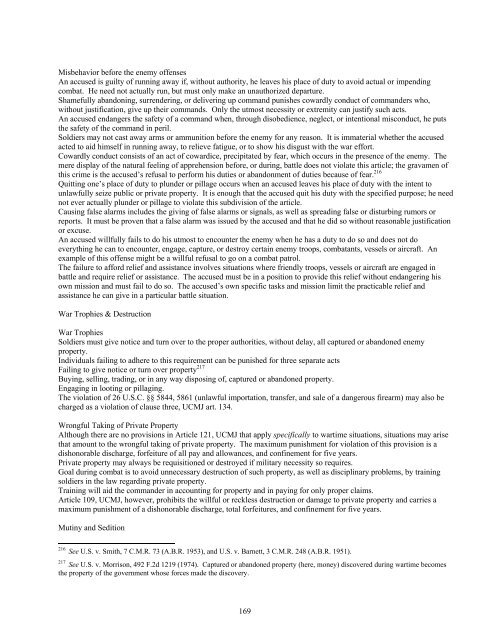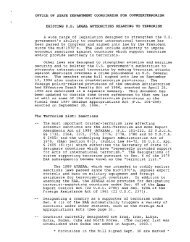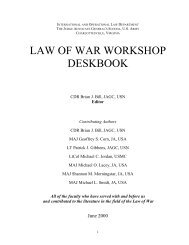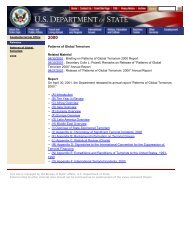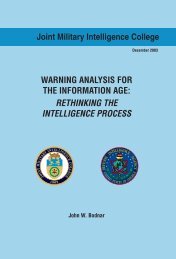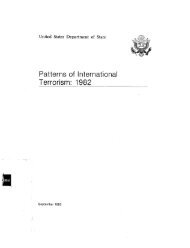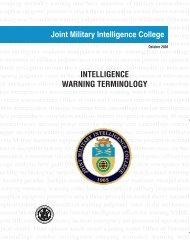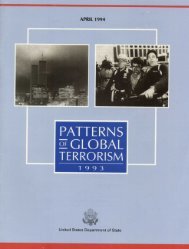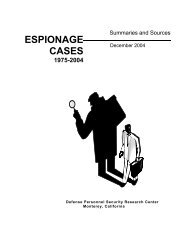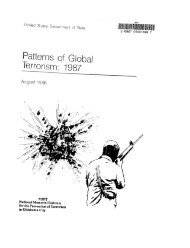- Page 1 and 2:
OPERATIONAL LAW HANDBOOK(2004)MAJ J
- Page 3:
TABLE OF CONTENTSLegal Basis for th
- Page 6 and 7:
as well as other multilateral inter
- Page 8 and 9:
The questions that inevitably arise
- Page 10 and 11:
extension of anticipatory self defe
- Page 12 and 13:
the direction of the National Comma
- Page 14 and 15:
NOTESChapter 1Legal Basis for the U
- Page 16 and 17:
the legal sources of the law, the c
- Page 18 and 19:
or munition would be deemed to caus
- Page 20 and 21:
etention and use (even in retaliati
- Page 22 and 23:
E. Effect of legal review. The weap
- Page 24 and 25:
(9) Biological. The 1925 Geneva Pro
- Page 26 and 27:
D. Undefended places. The attack or
- Page 28 and 29:
phony network of camps manned by se
- Page 30 and 31:
e. CUSTOMS—prepare for customs in
- Page 32 and 33:
g. Shipwrecked members of the armed
- Page 34 and 35:
offenses causing the death of one o
- Page 36 and 37:
1. The role of the ICRC as an impar
- Page 38 and 39:
Law of War, the preparation for tri
- Page 40 and 41:
. Geneva Protocol I, Article 44 - C
- Page 42 and 43:
D. Treachery and Perfidy - Feigning
- Page 44 and 45:
A. Fight only enemy combatants.B. D
- Page 46 and 47:
CHAPTER 3HUMAN RIGHTSREFERENCES1. G
- Page 48 and 49:
6. Taking of hostages,7. Punishment
- Page 50 and 51:
D. This “self-execution” doctri
- Page 52 and 53:
APPENDIXUNIVERSAL DECLARATION OF HU
- Page 54 and 55:
2. No one shall be arbitrarily depr
- Page 56 and 57:
CHAPTER 4LAW OF WAR IN MILITARY OPE
- Page 58 and 59:
Although in theory understanding th
- Page 60 and 61:
10. To understand the contemporary
- Page 62 and 63:
APPENDIX ATREATMENT OF PERSONSVI.FO
- Page 64 and 65:
G. When applying law by analogy, lo
- Page 66 and 67:
APPENDIX BTREATMENT OF PROPERTYIX.T
- Page 68 and 69:
APPENDIX CDISPLACED PERSONSX. TREAT
- Page 70 and 71:
3. No statutory limit to the length
- Page 72 and 73:
CHAPTER 5RULES OF ENGAGEMENTREFEREN
- Page 74 and 75:
D. Purpose. The purpose is twofold:
- Page 76 and 77:
defense is often different and will
- Page 78 and 79:
3. Accordingly, the drafting of ROE
- Page 80 and 81:
imperative format. Although such an
- Page 82 and 83:
CJCSI 3121.01A15 January 20005. Def
- Page 84 and 85:
CJCSI 3121.01A15 January 2000I -- D
- Page 86 and 87:
CJCSI 3121.01A15 January 2000(3) Pa
- Page 88 and 89:
CJCSI 3121.01A15 January 2000b. Nat
- Page 90 and 91:
CJCSI 3121.01A15 January 2000b. Col
- Page 92 and 93:
CJCSI 3121.01A15 January 2000(1) U.
- Page 94 and 95:
CJCSI 3121.01A15 January 2000(c) Re
- Page 96 and 97:
CJCSI 3121.01A15 January 2000(9) RO
- Page 98 and 99:
Peace Enforcement: KFOR (Kosovo, Ju
- Page 100 and 101:
Armed Conflict: OPERATION IRAQI FRE
- Page 102 and 103:
CHAPTER 6NATIONAL SECURITY STRUCTUR
- Page 104 and 105:
4) Operational Elements.(3) Regiona
- Page 106 and 107:
c) Combatant Commander Authorityi)
- Page 108 and 109:
CHAPTER 7LAW OF THE SEA, AIR, AND S
- Page 110 and 111:
a. Straight Baselines may be utiliz
- Page 112 and 113:
• Status of Forces Agreements. Th
- Page 114 and 115:
their navigation and submarines may
- Page 116 and 117:
• Ships engaged in the slave trad
- Page 118 and 119:
CHAPTER 8CIVILIAN PERSONNEL SUPPORT
- Page 120 and 121:
G. Notice of the anthrax vaccine re
- Page 122 and 123: determines areas entitled to receiv
- Page 124 and 125: obtain a local license for the coun
- Page 126 and 127: NOTESChapter 8Civilian Personnel122
- Page 128 and 129: 4. TYPES OF CLAIMS APPLICABLE DURIN
- Page 130 and 131: e. Claims Cognizable under Internat
- Page 132 and 133: countries where the Department of t
- Page 134 and 135: exclude claims arising from “war
- Page 136 and 137: APPENDIX AAssignment of Single-Serv
- Page 138 and 139: APPENDIX BUNIT CLAIMS OFFICER DEPLO
- Page 140 and 141: Enclosure 1 - Unit Claims Officer A
- Page 142 and 143: Enclosure 2 - Investigators Intervi
- Page 144 and 145: 9. Findings. Fully describe the inc
- Page 146 and 147: G. Secure a supply of the forms lis
- Page 148 and 149: APPENDIX DSAMPLE DEPLOYMENT CLAIMS
- Page 150 and 151: D. Forward a brief monthly claims r
- Page 152 and 153: Enclosure 1 - Claims Chronology She
- Page 154 and 155: Enclosure 3 - Request for Ex Gratia
- Page 156 and 157: Enclosure 4 - Example Implementing
- Page 158 and 159: Enclosure 5 - FCC Data SheetFOREIGN
- Page 160 and 161: Enclosure 7 - Partial Claims Settle
- Page 162 and 163: NOTESChapter 9, Appendix DClaims158
- Page 164 and 165: Field Manual (FM) 27-100 lists four
- Page 166 and 167: If authority is not present, JAs sh
- Page 168 and 169: For courts-martial this is largely
- Page 170 and 171: Army commanders may impose NJP on p
- Page 174 and 175: Extremely dangerous wartime offense
- Page 176 and 177: AppendicesA. Sample Transfer of Jur
- Page 178 and 179: 5. COMMAND AND SIGNAL. Basic Planni
- Page 180 and 181: Appendix CDESERT SHIELD GENERAL ORD
- Page 182 and 183: JTF 190 (HAITI) GENERAL ORDER NO.11
- Page 184 and 185: ALLIED FORCE/ALLIED HARBOR (Balkans
- Page 186 and 187: NOTESChapter 10, Appendix BCriminal
- Page 188 and 189: d) As a final introductory matter,
- Page 190 and 191: project that is prohibited or stric
- Page 192 and 193: implement Executive Order 12,114. I
- Page 194 and 195: that this translation takes a form
- Page 196 and 197: agreements or issues. The Army must
- Page 198 and 199: simple breach only requires parties
- Page 200 and 201: to the three element threshold set
- Page 202 and 203: THE OIL POLLUTION ACT OF 1990 - 33
- Page 204 and 205: NOTESChapter 11Environmental Law200
- Page 206 and 207: 37. Executive Order No. 11958, Jan.
- Page 208 and 209: Nov. 4, 1997. The election is bindi
- Page 210 and 211: subdivisions); 31 U.S.C. 1517; DFAS
- Page 212 and 213: a. This authority applies to deploy
- Page 214 and 215: 3) The first pillar is commonly ref
- Page 216 and 217: Command (who is the senior rater fo
- Page 218 and 219: 8) Anti-Terrorism Assistance, which
- Page 220 and 221: crime control and police training s
- Page 222 and 223:
advising that may engage United Sta
- Page 224 and 225:
cost” recovery when the services
- Page 226 and 227:
5. Summary. As reflected in the for
- Page 228 and 229:
concerns resulted in refusal to acc
- Page 230 and 231:
were reasonably related to DoD purp
- Page 232 and 233:
the HCA project. The promotion of t
- Page 234 and 235:
U.S. combat units are not participa
- Page 236 and 237:
Iraq until on or about 1 May 03. Th
- Page 238 and 239:
MMC funds, not O&M, for all permane
- Page 240 and 241:
1990, President Bush invoked this a
- Page 242 and 243:
NOTESChapter 12Fiscal Law238
- Page 244 and 245:
multiplier, deployment contracting
- Page 246 and 247:
word-processing documents. Translat
- Page 248 and 249:
award (low-cost, technically-accept
- Page 250 and 251:
ii. Extent of obligation.iii. Prici
- Page 252 and 253:
deployment region. For example, the
- Page 254 and 255:
without compensation to the owner.
- Page 256 and 257:
c. The resulting contract would oth
- Page 258 and 259:
APPENDIX ASF 44INSTRUCTIONS FOR THE
- Page 260 and 261:
SF 44BOTTOM HALFChapter 13, Appendi
- Page 262 and 263:
INSTRUCTION TO COMMANDERS1. You mus
- Page 264 and 265:
RECEIPTThis is a receipt for your p
- Page 266 and 267:
a. DoD 5240.1-R is the sole authori
- Page 268 and 269:
APPENDIX AREFERENCESThe attached li
- Page 270 and 271:
NavySECNAVINST 3300.2, Combating Te
- Page 272 and 273:
NOTESChapter 14, Appendix AIntellig
- Page 274 and 275:
1. The applicant for CO status must
- Page 276 and 277:
a. The Joint Ethics Regulation (JER
- Page 278 and 279:
AR 735-5, Policies and Procedures f
- Page 280 and 281:
(1) Simple negligence - the failure
- Page 282 and 283:
(2) Direct responsibility.(a) An ob
- Page 284 and 285:
c. No involuntary withholding for t
- Page 286 and 287:
Administrative Investigations. AR 1
- Page 288 and 289:
4) Formal Procedures. These board w
- Page 290 and 291:
(5) Possible criminal implications
- Page 292 and 293:
APPENDIXARMY REGULATION 15-6INVESTI
- Page 294 and 295:
PRELIMINARY MATTERS1. Appointing au
- Page 296 and 297:
c. Although AR 15-6 does not requir
- Page 298 and 299:
investigation is complete. This pre
- Page 300 and 301:
2. Investigative Plan.a. Does the i
- Page 302 and 303:
Negotiating an agreement.Implementi
- Page 304 and 305:
4) The most important authority tha
- Page 306 and 307:
a. Types of Criminal Jurisdiction A
- Page 308 and 309:
United States may, at its discretio
- Page 310 and 311:
value; or cash. In addition, ACSA a
- Page 312 and 313:
a. During combat readiness exercise
- Page 314 and 315:
STEPS WORK CENTER REQUIRED ACTION1
- Page 316 and 317:
e. Immunizationsf. HIV Testing not
- Page 318 and 319:
c. During an exercise, judge advoca
- Page 320 and 321:
e. Establishment of good working re
- Page 322 and 323:
CHECKLISTSTable 3: Sample Ready Box
- Page 324 and 325:
JA 260JA 261JA 262JA 263JA 265JA 26
- Page 326 and 327:
34. National Defense Authorization
- Page 328 and 329:
to inflict mass casualties. Histori
- Page 330 and 331:
C. NSC’s Counterterrorism & Natio
- Page 332 and 333:
N. Military Authority. Upon notific
- Page 334 and 335:
1. Exclusive jurisdiction means tha
- Page 336 and 337:
A. Legal Basis for Military Use of
- Page 338 and 339:
In addition to the Military Commiss
- Page 340 and 341:
I. INTRODUCTIONA. “Information Op
- Page 342 and 343:
a. IA ensures the “availability,
- Page 344 and 345:
III. INTERNATIONAL LEGAL CONSIDERAT
- Page 346 and 347:
deliberate actions of one belligere
- Page 348 and 349:
ecords, telephone number or other s
- Page 350 and 351:
FOREIGN INTELLIGENCE INFORMATION: I
- Page 352 and 353:
NOTESChapter 19Information Operatio
- Page 354 and 355:
31. AR 700-131, Loan and Lease of A
- Page 356 and 357:
. “Civil support (CS)” is not d
- Page 358 and 359:
(2) A member of the National Guard
- Page 360 and 361:
a. Criminal Sanctions. 2 years impr
- Page 362 and 363:
(1) Military Working Dog Team. A sp
- Page 364 and 365:
Support to Law Enforcement Agencies
- Page 366 and 367:
3710.01. Example: For certain missi
- Page 368 and 369:
1. Military forces shall not be use
- Page 370 and 371:
. As a prerequisite, the Governor m
- Page 372 and 373:
ESF 3 - Public Works and Engineerin
- Page 374 and 375:
a. Unlike the GARDEN PLOT Rules of
- Page 376 and 377:
operated by PSYOP personnel, with t
- Page 378 and 379:
National Defense Authorization Act,
- Page 380 and 381:
THE SECRETARY OF DEFENSE1000 DEFENS
- Page 382 and 383:
Guard counterdrug ground reconnaiss
- Page 384 and 385:
DEPUTY SECRETARY OF DEFENSE101 DEFE
- Page 386 and 387:
The Director of Administration and
- Page 388 and 389:
International Security Affairs (ASD
- Page 390 and 391:
c. WLG also serves as coordinator w
- Page 392 and 393:
D. Status of Personnel. In NEOs, co
- Page 394 and 395:
NOTESChapter 21NEO394
- Page 396 and 397:
39. Rescue Mission Report, August 1
- Page 398 and 399:
commands within USASOC such as the
- Page 400 and 401:
the deployed detachments. This is a
- Page 402 and 403:
1. This activity covers a broad spe
- Page 404 and 405:
2) CA activities are activities per
- Page 406 and 407:
operations centralize the populatio
- Page 408 and 409:
21) DoD also conducts operations ou
- Page 410 and 411:
H. Counterproliferation (CP) of Wea
- Page 412 and 413:
made by a seasoned SF NCO. Any CD m
- Page 414 and 415:
NOTESChapter 22Special Operations41
- Page 416 and 417:
strategy for resolving internationa
- Page 418 and 419:
P.L. 107-46, which authorizes payme
- Page 420 and 421:
2. Whereas peace operations are aut
- Page 422 and 423:
- Second generation peacekeeping 40
- Page 424 and 425:
- Outline proposals for the movemen
- Page 426 and 427:
- Permissions to operate UN vehicle
- Page 428 and 429:
2) (U.S./UN). U.S./UN forwards the
- Page 430 and 431:
c. Section 551 Foreign Assistance A
- Page 432 and 433:
APPENDIX ACONVENTION ON THE PRIVILE
- Page 434 and 435:
SECTION 13. Where the incidence of
- Page 436 and 437:
SECTION 30. All differences arising
- Page 438 and 439:
Recognizing that United Nations ope
- Page 440 and 441:
Article 8Duty to release or return
- Page 442 and 443:
Article 16Mutual assistance in crim
- Page 444 and 445:
2. For each State ratifying, accept
- Page 446 and 447:
1. With consent: RC members may be
- Page 448 and 449:
NOTESChapter 24Reserve Component448
- Page 450 and 451:
III. The Deputy Secretary of Defens
- Page 452 and 453:
Chapter 25Joint Operations - DoD452
- Page 454 and 455:
IV.MILITARY SERVICE CHIEFSThe milit
- Page 456 and 457:
ARMYYou can fly over a land forever
- Page 458 and 459:
C. There are different types of div
- Page 460 and 461:
III.ROLE OF THE ARMY OPERATIONAL LA
- Page 462 and 463:
4. Synergy. Internally, the mission
- Page 464 and 465:
component commander (JFACC) is the
- Page 466 and 467:
coordination with other Services co
- Page 468 and 469:
AF Combat Wing OrganizationWing Sta
- Page 470 and 471:
AEF COMPONENT AIRCRAFT ASSETSON-CAL
- Page 472 and 473:
(division, wing, FSSG) has a SJA an
- Page 474 and 475:
B. MARITIME PREPOSITIONING FORCE. A
- Page 476 and 477:
Chapter 25Joint Operations - Marine
- Page 478 and 479:
Chapter 25Joint Operations - Marine
- Page 480 and 481:
NAVYA. The 1997 National Military S
- Page 482 and 483:
COAST GUARDREFERENCES1. Title 14, U
- Page 484 and 485:
Commander, Atlantic Area and Fifth
- Page 486 and 487:
2. Enforcing domestic fisheries law
- Page 488 and 489:
NORTH ATLANTIC TREATY ORGANIZATION
- Page 490 and 491:
H. Article 5 is the soul of NATO in
- Page 492 and 493:
L. The Alliance rests upon commonal
- Page 494 and 495:
B. International law, including the
- Page 496 and 497:
4. The following categories of info
- Page 498 and 499:
iased articles. If only one side of
- Page 500 and 501:
a) In stand-up interviews, stand st
- Page 502 and 503:
6. After It’s All Overx) Never li
- Page 504 and 505:
APPENDIXJOINT PUB 3-61, (May 1997)G
- Page 506 and 507:
NOTESChapter 26, AppendixMedia Rela
- Page 508 and 509:
esponsible for taking the brigade c
- Page 510 and 511:
fire on enemy forces defending the
- Page 512 and 513:
of the operation, while affording t
- Page 514 and 515:
may prefer to use a shorthand appro
- Page 516 and 517:
APPENDIXFORMATS FOR LEGAL APPENDICE
- Page 518 and 519:
Chapter 27, AppendixMDMP and OPLANS
- Page 520 and 521:
CLASSIFICATIONSAMPLE LEGAL APPENDIX
- Page 522 and 523:
(1) (U) Acts of violence. UNMIH per
- Page 524 and 525:
NOTESChapter 27, AppendixMDMP and O
- Page 526 and 527:
3) In the Operations Center: A Judg
- Page 528 and 529:
issues. Lastly, the Advanced Operat
- Page 530 and 531:
temperature range, winds over 45 kn
- Page 532 and 533:
fratricides, and civilians on the b
- Page 534 and 535:
environment often requires JAs and
- Page 536 and 537:
critical to conducting mission anal
- Page 538 and 539:
NOTESChapter 28CLAMO538
- Page 540 and 541:
Center for Disaster Management & Hu
- Page 542 and 543:
GAO Comptroller General Decisions h
- Page 544 and 545:
Naval Postgraduate School http://ww
- Page 546 and 547:
White House http://www.whitehouse.g
- Page 548 and 549:
GLOSSARYAAAAADCAADCOMAADCOORDAATFAB
- Page 550 and 551:
CEPCFACFLCFZCGCGSCCICIACIDCIFCIMICC
- Page 552 and 553:
FACForward Air ControllerFANS Frien
- Page 554 and 555:
JOAJoint Operations AreaJOPES Joint
- Page 556 and 557:
OPLANOPLAWOPLAWYEROPORDEROPSECORFPA
- Page 558 and 559:
TAMMCTBDTCTCPTCSBTDATDSTEWTTFTHREAT
- Page 560 and 561:
INDEX15-6 Investigation Guide, 2921
- Page 562 and 563:
Military Necessity, 12, 13Military


